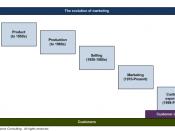Introduction ë Change is recognised as endemic and adaption considered to be the Darwinian condition for survival. Changing needs present potential market opportunities which drive the company. û ( Jobber. D. 1995. Page 7.) Marketers have recognised that marketing is a human activity, which facilitates the aim, of satisfying the needs and wants of consumers through an exchange process. The market concept then consists of recognising and creating consumers' needs and wants , which then creates a potential market opportunity, which consequently aims to satisfy this need. Market orientation, however, takes a broader view, McNamara defines it as : ë a philosophy of business management, based upon a company-wide acceptance of the need for customer orientation, profit orientation, and recognition of the important roles of marketing in communicating the needs of the market to all major corporate departments. û (as quoted in Kohli. A.K. & Jaworski. B.J.1990.page 3.) Consequently, market orientation is seen to mean 'the implementation of the marketing concept'.
A brief outline of market orientation.
Kotler (1994) discusses four business philosophies or orientations toward the marketplace. The production concept states that consumers will purchase those products which are available in the greatest quantity and at the lowest cost to them. Little product differentiation is apparent at this stage. The product concept states that consumers will favour goods that are superior to others in quality or features. The selling concept shifts the emphasis from the product to aggressive selling and promotions. Closing the sale is the goal of this orientation. The selling concept is often characterised by an increase in the size of the sales force Finally, the marketing concept eschews the notion that the most important element in business philosophy is either the production capability or capacity or aggressive sales. Instead, this concept focuses on the needs...


